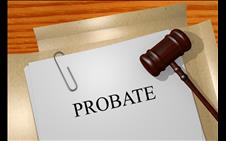|
Monday, January 23, 2017

When a person dies with a will in place, an executor is named as the responsible individual for winding down the decedent's affairs. In situations in which a will has not been prepared, the probate court will appoint an administrator. Whether you have been named as an executor or administrator, the role comes with certain responsibilities including taking charge of the decedent's assets, notifying beneficiaries and creditors, paying the estate's debts and distributing the property to the beneficiaries.
In some cases, an executor may also be a beneficiary of the will, however he or she must act fairly and in accordance with the provisions of the will. An executor is specifically responsible for:
-
Finding a copy of the will and filing it with the appropriate state court
-
Informing third parties, such as banks and other account holders, of the person’s death
-
Locating assets and identifying debts
-
Providing the court with an inventory of these assets and debts
-
Maintaining any assets until they are disposed of
-
Disposing of assets either through distribution or sale
-
Satisfying any debts
-
Appearing in court on behalf of the estate
Depending on the size of the estate and the way in which the decedent's assets were titled, the will may need to be probated.
Read more . . .
Monday, December 12, 2016

The most basic estate planning tool is a will which establishes how an individual's property will be distributed and names beneficiaries to receive those assets. Unfortunately, there are circumstances when disputes arise among surviving family members that can lead to a will contest. This is a court proceeding in which the validity of the will is challenged.
In order to have standing to bring a will contest, a party must have a legitimate interest in the estate. Although the law in this regard varies from state to state, the proceeding can be brought by heirs, beneficiaries, and others who stand to inherit.
Read more . . .
Monday, January 25, 2016

When someone dies without a will, it is known as dying intestate. In such cases, state law (of the state in which the person resides) governs how the person's estate is administered. In most states, the individual's assets are split -- with one third of the estate going to the spouse and all surviving children splitting the rest. For people who leave behind large estates, unless they have established trusts or other tax avoidance protections, there may be a tremendous tax liability, including both estate and inheritance tax.
For just about everyone, the cost of having a will prepared by a skilled and knowledgeable attorney is negligible when compared to the cost of dying intestate, since there are a number of serious consequences involved in dying without a proper will in place.
Legal Consequences
The larger your estate, the more catastrophic the consequences of dying intestate will be. If you die without a will, the freedom to decide how your property will be divided will be taken from you and the state in which you reside will divide your assets.
Not only will you not be able to decide on the distribution of your property, but a stranger will be making personal, familial decisions. This may be divisive among your family members; instead of leaving your loved ones in peace, you may leave them engaged in bitter disputes over a family heirloom or even a simple memento. This can be especially true in situations where there are children from a previous marriage.
Tax Consequences
In addition to the legal and personal problems associated with dying intestate, the tax results can be severe as well. This is particularly true for clients who have not consulted with an estate planning attorney in order to protect themselves through tax avoidance methods. Both the state and federal governments can tax the transfer of property and an inheritance tax may be imposed on the property you have left to your heirs.
The most effective way to avoid all of these negative tax consequences is to create a will with a competent attorney. Your lawyer will help you to choose a proper executor (the person who will administer your estate, distribute your property and pay your debts), and will assist you in finding ways to limit your tax liability. There are several ways your attorney can help you to do this:
- By gifting some of those you want to inherit before you die
- By creating one or several trusts
- By purchasing a life insurance policy
- By buying investments in your loved one's name
These methods will ensure that your loved ones receive the assets you desire them to have, while simultaneously protecting them from possibly enormous tax burdens after you pass.
For those who have no family, dying without a will can be even more troublesome and costly, since their entire fortunes can be left to the state. If a genealogical search doesn't turn up any blood relatives, all of your assets will be claimed by the government. This means that any individual, group, organization or charity you wished to endow will receive nothing.
It is never easy to think of one's own mortality, but it is even more painful to contemplate leaving a messy, uncomfortable situation behind when you pass. By engaging the services of an excellent estate planning attorney, who will help you fashion a legally binding, precisely designed document, you can make sure that your loved ones are well taken care of and that your final wishes are respected and implemented.
Monday, December 7, 2015
 When a loved one dies, an already difficult experience can be made much more stressful if that loved one held a significant amount of debt. Fortunately, the law addresses how an individual’s debts can be paid after he or she is deceased.
When a person dies, his or her assets are gathered into an estate. Some assets are not included in this process. Assets owned jointly between the deceased and another person pass directly to the other person automatically. If there are liens on the property at that time, they will stay on the property, but no new liens can be placed on the property for debts in the name of the deceased. Similarly, debt jointly in the name of the deceased and another party may continue to be collected from the other party. In community property states, all assets and debts are the joint property of both spouses and pass automatically from one to the other. The community property states are Alaska, Arizona, California, Idaho, Louisiana, Nevada, New Mexico, Texas, Washington, and Wisconsin.
From the pool of assets in the estate, an executor is required to pay all just debts. This means that, before a beneficiary may receive anything, all debts must be satisfied. Property might be sold to create liquidity in order to accomplish this. If there are more debts than there are assets, the estate must sell of as many assets as possible to pay off the creditors. If there is no money in the estate, the creditor can not collect anything. Rather than force people into this tiresome process, many creditors will agree to discharge a debt upon receipt of a copy of a death certificate or obituary. This is particularly true of small, unsecured debts. Life insurance proceeds were never owned by the decedent and should pass to a beneficiary without consequence to the estate. Proceeds of a retirement account may also be exempt from debts.
If creditors continue harassing the beneficiaries of debtors, they may be violating federal regulations under the FDCPA. They can be held accountable by their actions, either by the FTC, the state attorney general, or a private consumer law attorney.
Wednesday, May 27, 2015
7860.jpg) If you’re involved in settling a loved one’s estate, you may come across the curious word “ademption”. Ademption describes what happens when something designated in a will no longer exists. Say, for example, your uncle dies and leaves for you in his will an old-school Harley Davidson motorcycle. However, if your uncle crashed the motorcycle two years before the will was probated and there’s nothing to leave, then that gift would be considered adeemed and you would receive nothing. This is why certain wills include language that says, “if owned by me at my death.” If you’re involved in settling a loved one’s estate, you may come across the curious word “ademption”. Ademption describes what happens when something designated in a will no longer exists. Say, for example, your uncle dies and leaves for you in his will an old-school Harley Davidson motorcycle. However, if your uncle crashed the motorcycle two years before the will was probated and there’s nothing to leave, then that gift would be considered adeemed and you would receive nothing. This is why certain wills include language that says, “if owned by me at my death.”
However, it is important to realize that certain items cannot be adeemed. For instance, money. If your uncle died and left $7,000 for you in his will, but left a zero dollar balance in his accounts, your gift of cash would not be adeemed. Instead, the estate would be responsible for satisfying that gift, say for example, through the sale of the house or other such property.
There are exceptions to ademption, however. If the property leaves the estate after the person who wrote the will has been declared incompetent, ademption is waived. Other states make exceptions for cases where interest in a corporation that no longer exists because the shares were exchanged with that of an acquiring company. Your state may tackle ademption differently based on its laws, so please consult a qualified real estate or probate lawyer if you want to learn more about ademption and its exceptions.
Monday, December 22, 2014
 The death of a loved one is a difficult experience no matter the circumstances. It can be especially difficult when a person dies without a will. If a person dies without a will and there are assets that need to be distributed, the estate will be subject to the process of administration instead of probate proceedings. The death of a loved one is a difficult experience no matter the circumstances. It can be especially difficult when a person dies without a will. If a person dies without a will and there are assets that need to be distributed, the estate will be subject to the process of administration instead of probate proceedings.
In this case, the decedent’s heirs can select someone to manage the estate, called an administrator instead of executor. State law will provide who has priority to be appointed as the administrator. Most states’ laws provide that a spouse will have priority and in the event that there is no spouse, the adult children are next in line to serve. However, those that have priority can decline to serve, and the heirs can sign appropriate affidavits or other pleadings to be filed with the court that nominate someone else as the administrator. Once the judge appoints the nominated person they will then have the authority to act and begin estate administration.
In certain circumstances, it may be necessary to change the initially appointed administrator during the administration process. Whether this is advisable depends on many factors. First, the initial administrator will have started the process and will be familiar with what remains to be done. The new administrator will likely be behind in many aspects of the case and may have to review what the prior administrator did. This can cause expenses and delays. Also, it is possible that the attorney representing the initial administrator may not be able to ethically represent the new one, again causing increased expenses and delays. However, if the first administrator is not doing his/her job, the heirs can petition to remove the individual and appoint a new one.
If you are currently involved in a situation where an estate needs to be administered, it is recommended that you speak with an estate planning attorney in your state.
Saturday, August 30, 2014
6696.jpg)
Properly drafted estate planning documents are integral to the success of your legacy and end-of-life wishes. Iron-clad estate planning documents, written by a knowledgeable attorney can make the difference between the success and failure of having your wishes carried out. However, there’s more to estate planning than paperwork. For your wishes to have the best chance of being honored, it is important to carefully choose the people who will carry them out.
Your estate plan can assign different responsibilities to different people. The person who you most trust to raise your children, for example, may not be the person you’d designate to make health care decisions on your behalf, if you are incapacitated. Before naming individuals to carry out your various estate and incapacity planning wishes, you should carefully consider the requirements of each role and the attributes which each individual has that will allow him or her to perform the duties effectively.
Executor. You name the executor, (also known as a personal representative), in your will. This person is responsible for carrying out all the terms of your will and guiding your will through probate, if necessary. The executor usually works closely with a probate or estate administration attorney, especially in situations where will contests arise and your estate becomes involved in litigation. You may appoint co-executors, or name a professional – such as a lawyer or accountant – as the co-executor.
Health care proxy. Your health care proxy is the person you name to make medical decisions for you in the event you are incapacitated and unable to do so yourself. In addition to naming a health care proxy (sometimes called a health care power of attorney), most people also create a living will (or health care directive), in which they directly state their wishes for medical care and end-of-life care in the event of incapacity. When choosing a health care proxy, select a person who you know understands your wishes regarding medical care, and who you trust to carry out those wishes, even if other family members disagree. You should also consider individuals who have close geographic proximity to you as well as persons you believe can make difficult decisions under pressure.
Power of attorney. A financial power of attorney (or simply power of attorney) is different from a health care power of attorney in that it gives another person the authority to act on your behalf in financial matters including banking, investments and taxes. You can limit the areas in which the person may act, or you may grant unlimited authority. A power of attorney may also be limited for a specific time, or it may be a durable power of attorney, in which case it will continue even after the onset of incapacity (until your death). A power of attorney can take effect immediately or “spring” into effect in the event of incapacity.
Guardians. If you have minor children or other dependents (disabled adult children or other disabled adults for whom you are the named guardian), then your estate plan should name a person or persons to take over the parental role in the event of your death. The guardian may also have control over any assets that you leave directly to your minor children or other dependents. If you create a trust for the benefit of your minor children, then the trust’s trustee(s) will have control over those assets and their distribution. Important considerations include age of the guardian, compatibility with his or her personality and moral values as well as the extent and quality of the existing relationship with your children.
Trustee. If you place any assets in trust as part of your estate plan, then you must designate one or more trustees, who will act as the legal owners of the trust. If you do not wish to appoint someone you know personally, you may appoint a corporate trustee – often a bank – to play this role. Corporate trustees are often an excellent choice, since they are financial professionals and neutral, objective third parties. Its important you select individuals who are not only trustworthy but also organized, diligent and detail oriented.
Friday, August 22, 2014
8999.jpg)
Transfer of property at death can be rather complex. Many are under the impression that instructions provided in a valid will are sufficient to transfer their assets to the individuals named in the will. However, there are a myriad of rules that affect how different types of assets transfer to heirs and beneficiaries, often in direct contradiction of what may be clearly stated in one’s will.
The legal process of administering property owned by someone who has passed away with a will is called probate. Prior to his passing, a deceased person, or decedent, usually names an executor to oversee the process by which his wishes, outlined in his Will, are to be carried out. Probate property, generally consists of everything in a decedent’s estate that was directly in his name. For example, a house, vehicle, monies, stocks or any other asset in the decedent’s name is probate property. Any real or personal property that was in the decedent’s name can be defined as probate property.
The difference between non-probate property and probate centers around whose name is listed as owner. Non-probate property consists of property that lists both the decedent and another as the joint owner (with right of survivorship) or where someone else has already been designated as a beneficiary, such as life insurance or a retirement account. In these cases, the joint owners and designated beneficiaries supersede conflicting instructions in one’s will. Other examples of non-probate property include property owned by trusts, which also have beneficiaries designated. At the decedent’s passing, the non-probate items pass automatically to whoever is the joint owner or designated beneficiary.
Why do you need to know the difference? Simply put, the categories of probate and non-probate property will have a serious effect on how plan your estate. If you own property jointly with right of survivorship with another individual, that individual will inherit your share, regardless of what it states in your will. Estate and probate law can be different from state-to-state, so it’s best to have an attorney handle your estate plan and property ownership records to ensure that your assets go to the intended beneficiaries.
Wednesday, July 30, 2014

If you’ve been named a beneficiary in a loved one’s estate plan, you’ve likely wondered how long it will take to receive your share of the inheritance after his or her passing. Unfortunately, there’s no hard or and fast rule that allows an estate planning attorney to answer this question. The length of time it takes to distribute assets in an estate can vary widely depending upon the particular situation.
Some of the factors that will be involved in determining how long it takes to fully administer an estate include whether the estate must be probated with the court, whether assets are difficult to value, whether the decedent had an ownership interest in real estate located in a state other than the state they resided in, whether your state has a state estate (or inheritance) tax, whether the estate must file a federal estate tax return, whether there are a number of creditors that must be dealt with, and of course, whether there are any disputes about the will or trust and if there may be disagreements among the beneficiaries about how things are being handled by the executor or trustee.
Before the distribution of assets to beneficiaries, the executor and trustee must also make certain to identify any creditors because they have an obligation to pay any legally enforceable debts of the decedent with those assets. If there must be a court filed probate action there may be certain waiting periods, or creditor periods, prescribed by state law that may delay things as well and which are out of the control of the executor of the estate.
In some cases, the executor or trustee may make a partial distribution to the beneficiaries during the pending administration but still hold back sufficient assets to cover any income or estate taxes and other administrative fees. That way the beneficiaries can get some benefit but the executor is assured there are assets still in his or her control to pay those final taxes and expenses. Then, once those are fully paid, a final distribution can be made. It is not unusual for the entire process to take 9 months to 18 months (sometime more) to fully complete.
If you’ve been named a beneficiary and are dealing with a trustee or executor who is not properly handling the estate and you have yet to receive your inheritance, you should contact a qualified estate planning attorney for knowledgeable legal counsel.
Wednesday, July 16, 2014
6948.jpg)
If a person becomes mentally or physically handicapped to a point where they can no longer make rational decisions about their person or their finances, their loved ones may consider a guardianship or a conservatorship whereby a guardian would make decisions concerning the physical person of the disabled individual, and conservators make decisions about the finances.
Typically, a loved one who is seeking a guardianship or a conservatorship will petition the appropriate court to be appointed guardian and/or conservator. The court will most likely require a medical doctor to make an examination of the disabled individual, also referred to as the ward, and appoint an attorney to represent the ward’s interests. The court will then typically hold a hearing to determine whether a guardianship and/or conservatorship should be established. If so, the ward would no longer have the ability to make his or her own medical or financial decisions. The guardian and/or conservator usually must file annual reports on the status of the ward and his finances.
Guardianships and conservatorships can be an expensive legal process, and in many cases they are not necessary or could be avoided with a little advance planning. One way is with a financial power of attorney, and advance directives for healthcare such as living wills and durable powers of attorney for healthcare. With those documents, a mentally competent adult can appoint one or more individuals to handle his or her finances and healthcare decisions in the event that he or she can no longer take care of those things. A living trust is also a good way to allow someone to handle your financial affairs – you can create the trust while you are alive, and if you become incompetent someone else can manage your property on your behalf.
In addition to establishing durable powers of attorney and advanced healthcare directives, it is often beneficial to apply for representative payee status for government benefits. If a person gets VA benefits, Social Security or Supplemental Security Income, the Social Security Administration or the Veterans’ Administration can appoint a representative payee for the benefits without requiring a conservatorship. This can be especially helpful in situations in which the ward owns no assets and the only income is from Social Security or the VA.
When a loved one becomes mentally or physically handicapped to the point of no longer being able to take care of his or her own affairs, it can be tough for loved ones to know what to do. Fortunately, the law provides many options for people in this situation.
Thursday, July 10, 2014

During the estate planning process, your attorney will draft a number of legal documents such as a will, trust and power of attorney which will help you accomplish your goals. While these legal documents are required for effective planning, they may not sufficiently convey your thoughts and wishes to your loved ones in your own words. A letter of instruction is a great compliment to your “formal” estate plan, allowing you to outline your wishes with your own voice.
This letter of instruction is typically written by you, not your attorney. Some attorneys may, however, provide you with forms or other documents that can be helpful in composing your letter of instruction. Whether your call this a "letter of instruction" or something else, such a document is a non-binding document that will be helpful to your family or other loved ones.
There is no set format as to what to include in this document, though there are a number of common themes.
First, you may wish to explain, in your own words, the reasoning for your personal preferences for medical care especially near the end of life. For example, you might explain why you prefer to pass on at home, if that is possible. Although this could be included in a medical power of attorney, learning about these wishes in a personalized letter as opposed to a sterile legal document may give your loved ones greater peace of mind that they are doing the right thing when they are charged with making decisions on your behalf. You might also detail your preferences regarding a funeral, burial or cremation. These letters often include a list of friends to contact upon your death and may even have an outline of your own obituary.
You may also want to make note of the following in your letter to your loved ones:
- an updated list of your financial accounts with account numbers;
- a list of online accounts with passwords;
- a list of important legal documents and where to find them;
- a list of your life insurance and where the actual policies are located;
- where you have any safe deposit boxes and the location of any keys;
- where all car titles are located; the
- names of your CPA, attorney, banker, insurance advisor and financial advisor;
- your birth certificate, marriage license and military discharge papers;
- your social security number and card;
- any divorce papers; copies of real estate deeds and mortgages;
- names, addresses, and phone numbers of all children, grandchildren, or other named beneficiaries.
In drafting your letter, you simply need to think about what information might be important to those that would be in charge of your affairs upon your death. This document should be consistent with your legal documents and updated from time to time.
StoneLAW, PLLC is a boutique law firm that assists clients in Minneapolis, Saint Paul and throughtout the Twin Cities region including Osseo, Hamel, Wayzala, Long Lake, Hopkins and Loretto in Hennepin County, Wright County and Ramsey County.
|

|
|
|